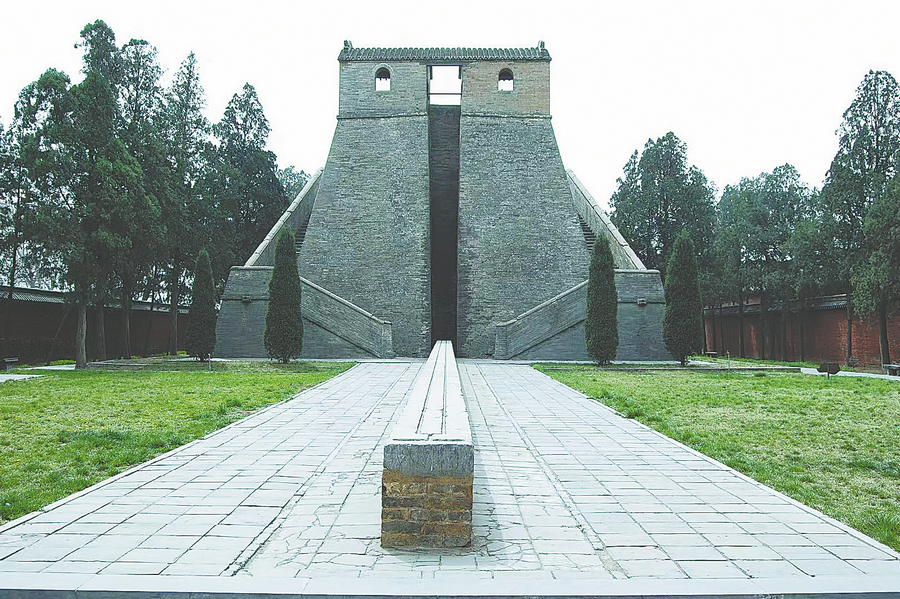Longest day is a turning point

The observatory built under the direction of astronomer Guo Shoujing (1231-1316) in Dengfeng city, Henan province, stands testimony to the understanding of the sun by ancient Chinese. [Photo/Xinhua]
The platform is a guibiao, an ancient Chinese sundial with a gui, a horizontal scale on the ground extending to the north, and a biao, a perpendicular bar standing upright. As the sun moves, the shadow of the biao is cast on the gui, and the length of the shadow at different times helps to trace variations of the sun's movement.
"It is said that the ancient Chinese found a day when the shortest shadow cast was about 50 centimeters, and that was the start of summer's hottest period. That is how the Summer Solstice was discovered," says Lyu, who is also director of the office of Dengfeng chronicles.
Ji's original platform was made from wood and earth, and being hard to preserve, had to be replaced many times over the years. Standing in its place today is a permanent guibiao, rebuilt using stone during the Tang Dynasty (618-907), that continues to tell stories about ancient Chinese endeavors in astronomy.
About 20 meters from Ji's platform is another observatory, built under the direction of Chinese astronomer Guo Shoujing (1231-1316) during the Yuan Dynasty (1271-1368), which has a similar structure to a guibiao, but is much larger in scale.
Guo built 27 observatories throughout the Yuan territories, and the one in Dengfeng is the only one that still exists. Based on his observations over the course of two years, he developed a new calendar called Shoushi Li (season-granting calendar), calculating a year to be 365.2425 days, just seconds off the current measurement of a year. The calendar was used for more than 360 years.
Both the sundial platform and observatory are part of the Historic Monuments of Dengfeng in"The Center of Heaven and Earth", which was inscribed on the UNESCO World Heritage List in 2010.
Due to such history, people in Dengfeng highlight the Summer Solstice and celebrate its arrival with a festival featuring various activities, including paying tribute to Ji, watching the shadow cast by the sun on the guibiao, and art performances.
According to Lyu, such celebrations, especially those paying tribute to Ji, have been held since ancient times, both in an official and folk capacity. After the end of the Qing Dynasty (1644-1911), official-level celebration was suspended, but people have never forgotten it and folk events continued.
"People want to express their gratitude for Ji, who is believed to have been the founder of the Twenty-Four Solar Terms. They have played a huge role in guiding agricultural production as a standard farming timetable. It promoted the development of agriculture, and has helped feed the nation," says Lyu.
While in modern China, xiazhi is simply known as one of the solar terms, in ancient times it was a major festival. In the Song Dynasty (960-1279), the festival offered officials a holiday of three days. A grand sacrificial ceremony, led by the incumbent emperor, was also held on the Summer Solstice during the Ming (1368-1644) and Qing dynasties.
According to Guo Wenbin, a scholar of traditional culture, many customs from the ancient Summer Solstice festivals, including dragon boat races, are now celebrated as part of events, such as Dragon Boat Festival, or Duanwu Festival.
"We often believe Duanwu was created to commemorate patriotic poet Qu Yuan of the Warring States Period, who committed suicide on the fifth day of the fifth lunar month. But, actually, before the death of Qu, Chinese people already celebrated Duanwu, which often fell between Grain in Ear, the ninth solar term, and Summer Solstice. Many customs of Duanwu we follow now are related to those two solar terms," says Guo.
A folk saying goes:"After eating Summer Solstice noodles, daylight will become shorter day by day". Since the Summer Solstice is often a time when people harvest wheat, it's a tradition to eat noodles. The Summer Solstice festival in Dengfeng includes an activity whereby nearly a thousand people eat noodles together.
As Summer Solstice represents the longest day, some environmental advocates have encouraged the switching off of lights for a couple of hours as a symbolic, and practical way, of saving energy. Related activities have been held in many cities across China and the world. This xiazhi, maybe more people will"see the light" and take the initiative to go outside and enjoy an extra few hours of sunshine.
 京公网安备 11010802027341号
京公网安备 11010802027341号